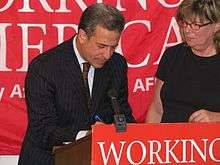Working America
Working America is the political organizing arm of the AFL-CIO.[3] Its membership is made up of non-union individuals.[1] It is the largest non-union workers' group in the United States, with a self-reported membership of 3.2 million individuals.[2] Working America advocates for progressive policy issues. The organization recruits people in working-class neighborhoods on their doorsteps in an effort to persuade them to support labor-backed candidates at election time.[4][5]
 | |
| Full name | Working America |
|---|---|
| Founded | 2003 |
| Members | 3.2 million[1][2] |
| Head union | Matt Morrison, executive director |
| Affiliation | AFL-CIO |
| Office location | Washington, D.C. |
| Country | United States |
| Website | www.workingamerica.org |
Overview
The organization started as a two-state pilot project of the AFL-CIO in 2003.[6] The organization was launched nationally that fall. The organization's founding director was Karen Nussbaum.
In October 2005, the organization announced that it had enrolled 1 million members.[7] It reported a membership of 2.5 million by the fall of 2008.[8]
Campaigns
Working America undertook its first nationwide activities in the 2004 U.S. presidential election. It organized a "Show Us The Jobs" bus tour of workers throughout the Midwest. The tour was critical of President George W. Bush's policies.[9][10]

Working America was active in the 2006 midterm congressional elections.[11] Working America activists were credited by the press and Democrats for helping to deliver federal and state victories in Ohio and Pennsylvania.[12]
In 2007, Working America began a campaign to build support for universal health care. The group established a "Health Care Hustle" website on which consumers could post stories about how lack of health insurance or under-insurance led to significant financial, health or other problems. Working America promised to launch a campaign against the organization or corporation which received the most "horror stories." The effort built upon a previous campaign by Working America in mid-2006 in which the organization asked the public to submit stories about "bad bosses."[13]
In 2015, Working America led a "massive get-out-the-vote effort" to elect Democrat Jack Conway as Governor of Kentucky. Conway was defeated by Republican Matt Bevin.[14]
Policy positions
Working America opposes liquor store privatization.[2] It supports the Affordable Care Act and Medicaid expansion.[15] The organization advocates for an increased minimum wage and universal health care.[4]
References
- Sixel, L.M. (March 21, 2012). "Sixel: Drive means everyone can join AFL-CIO". Houston Chronicle. Retrieved 21 April 2015.
- Eidelson, Josh (April 17, 2013). "AFL-CIO's Non-Union Worker Group Headed Into Workplaces in Fifty States". The Nation. Retrieved 21 April 2015.
- Miller, Justin (November 4, 2015). "The Labor Prospect: Election Hangover". American Prospect. Retrieved 9 November 2015.
- Meyerson, Harold (Fall 2014). "The Seeds of a New Labor Movement". American Prospect. Retrieved 21 April 2015.
- Boselovic, Len (September 8, 2005). "Embattled AFL-CIO works to involve nonunion households". Pittsburgh Post-Gazette. Retrieved 21 April 2015.
- "Working America on the march". Seattle Times. November 11, 2007. Retrieved 21 April 2015.
- Rogers, Joel; Berry Freeman, Richard. What Workers Want. Cornell University Press. p. 204. ISBN 9780801473258.
- Moberg, David (August 29, 2008). "Labor's New Push". The Nation. Retrieved 21 April 2015.
- Taylor, T. Sean (March 23, 2004). "Labor to assail Bush's record on jobs". Chicago Tribune. Retrieved 21 April 2015.
- "Labor bus tour highlights plight of unemployed, weak jobs market". USA Today. Associated Press. March 22, 2004. Retrieved 21 April 2015.
- Von Bergen, "No Union? No Problem," Duluth News-Tribune, May 12, 2006.
- Greenhouse, Steven (October 8, 2006). "Labor Goes Door to Door to Rally Suburban Voters". New York Times. Retrieved 21 April 2015.
- Sostek, Anya (March 2, 2007). "Unions take closer look at health-care stories". Pittsburgh Post-Gazette. Retrieved 21 April 2015.
- Mahoney, Brian (November 4, 2015). "Kentucky elects right-to-work governor". Politico. Retrieved 9 November 2015.
- "Working America represents at Medicaid Expansion Lobby Day". NC State AFL–CIO. March 27, 2015. Retrieved 21 April 2015.
External links
| Wikimedia Commons has media related to Working America. |